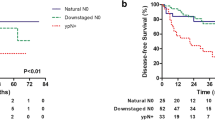Abstract
Background
Extensive lymph node dissection (LND) is beneficial in primarily resected esophageal cancer patients. Such benefit was believed to be seen in neoadjuvant chemoradiotherapy (CRT)-treated patients, but evidence was inconsistent. We hypothesized that CRT might offset the benefit of LND in certain subgroup of patients, especially in major responders.
Methods
The clinical pathological data and survival of esophageal squamous cell carcinoma patients who received curative resection after CRT between 1996 and 2007 were analyzed. On the basis of the mean LND number of the cohort, patients were divided into two groups: group 1, lower LND, and group 2, higher LND.
Results
The cohort comprised 303 patients (295 men and 8 women) with a mean age of 55.4 years. There were 179 patients in group 1 and 124 patients in group 2. One hundred one patients had pathological complete response (pCR). There were more pCR in group 1 (38 vs. 26.6 %, P = 0.039) and more lymph node positive cases in group 2 (16 vs. 27.4 %, P = 0.018). Extent of LND had no survival difference in the entire cohort (overall survival 32 vs. 38 %, P = 0.31). With the stratification analysis according to tumor response, inadequate LND exhibited negative impact in patients who did not experience pCR (P = 0.027). Without adequate LND, the survival of ypTxN0 was equally poor as ypN-positive cases (overall survival 15 vs. 16 %, P = 0.791). In the pCR group, the extent of LND had an impact on survival.
Conclusions
The effect of LND was influenced by tumor response after CRT. There is a strong survival benefit for extensive LND after CRT in esophageal squamous cell carcinoma, especially in non-pCR patients.


Similar content being viewed by others
References
Edge SB, Byrd DR, Compton CC, et al. AJCC cancer staging manual. 7th ed. New York: Springer; 2010.
Yang HX, Xu Y, Fu JH, et al. An evaluation of the number of lymph nodes examined and survival for node-negative esophageal carcinoma: data from China. Ann Surg Oncol. 2010;17:1901–11.
Lin CS, Chang SC, Wei YH, et al. Prognostic variables in thoracic esophageal squamous cell carcinoma. Ann Thorac Surg. 2009;87:1056–65.
Rizk NP, Ishwaran H, Rice TW, et al. Optimum lymphadenectomy for esophageal cancer. Ann Surg. 2010;251:46–50.
Greenstein AJ, Litle VR, Swanson SJ, et al. Effect of the number of lymph nodes sampled on postoperative survival of lymph node-negative esophageal cancer. Cancer. 2008;112:1239–46.
Sjoquist KM, Burmeister BH, Smithers BM, et al. Survival after neoadjuvant chemotherapy or chemoradiotherapy for resectable oesophageal carcinoma: an updated meta-analysis. Lancet Oncol. 2011;12:681–92.
Hu Y, Hu C, Zhang H, et al. How does the number of resected lymph nodes influence TNM staging and prognosis for esophageal carcinoma? Ann Surg Oncol. 2010;17:784–90.
Groth SS, Virnig BA, Whitson BA, et al. Determination of the minimum number of lymph nodes to examine to maximize survival in patients with esophageal carcinoma: data from the Surveillance Epidemiology and End Results database. J Thorac Cardiovasc Surg. 2010;139:612–20.
Solomon N, Zhuge Y, Cheung M, et al. The roles of neoadjuvant radiotherapy and lymphadenectomy in the treatment of esophageal adenocarcinoma. Ann Surg Oncol. 2010;17:791–803.
Doll D, Gertler R, Maak M, et al. Reduced lymph node yield in rectal carcinoma specimen after neoadjuvant radiochemotherapy has no prognostic relevance. World J Surg. 2009;33:340–7.
Habr-Gama A, Perez RO, Proscurshim I, et al. Absence of lymph nodes in the resected specimen after radical surgery for distal rectal cancer and neoadjuvant chemoradiation therapy: what does it mean? Dis Colon Rectum. 2008;51:277–83.
Tahara M, Ohtsu A, Hironaka S, et al. Clinical impact of criteria for complete response (CR) of primary site to treatment of esophageal cancer. Jpn J Clin Oncol. 2005;35:316–23.
Rohatgi PR, Swisher SG, Correa AM, et al. Failure patterns correlate with the proportion of residual carcinoma after preoperative chemoradiotherapy for carcinoma of the esophagus. Cancer. 2005;104:1349–55.
Berger AC, Farma J, Scott WJ, et al. Complete response to neoadjuvant chemoradiotherapy in esophageal carcinoma is associated with significantly improved survival. J Clin Oncol. 2005;23:4330–7.
Vallbohmer D, Holscher AH, DeMeester S, et al. A multicenter study of survival after neoadjuvant radiotherapy/chemotherapy and esophagectomy for ypT0N0M0R0 esophageal cancer. Ann Surg. 2010;252:744–9.
Baxter NN, Morris AM, Rothenberger DA, et al. Impact of preoperative radiation for rectal cancer on subsequent lymph node evaluation: a population-based analysis. Int J Radiat Oncol Biol Phys. 2005;61:426–31.
Acknowledgment
This study was supported in part by Grant NSC 100-2314-B-182A-018 from the National Science Council, Executive Yuan, and Grant NMRPG2A0011 from the Chang Gung Memorial Hospital, Taiwan, Republic of China.
Author information
Authors and Affiliations
Corresponding author
Rights and permissions
About this article
Cite this article
Chao, YK., Liu, HP., Hsieh, MJ. et al. Lymph Node Dissection after Chemoradiation in Esophageal Cancer: A Subgroup Analysis of Patients With and Without Pathological Response. Ann Surg Oncol 19, 3500–3505 (2012). https://doi.org/10.1245/s10434-012-2402-7
Received:
Published:
Issue Date:
DOI: https://doi.org/10.1245/s10434-012-2402-7




